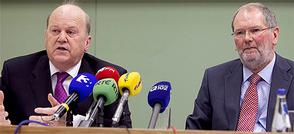
On Wednesday morning, September 12th, the Republic of Ireland hosted only it’s third bond auction since entering an EU-IMF bailout program in 2010. And while the other two auctions were noted as very positive developments for the eurozone member, this newest advancement smashed all expectations in a magnificent result for the country. The yield was just 0.70% as €500m was raised.
In comparison to an auction several months ago, selling precisely the exact same type of bonds, the yield demanded from investors was 1.80%, therefore Ireland fared more than 2.5 times better this time around with the interest rate. As well as raising the half a billion euros with an encouragingly low interest rate, the level of attraction from investors also hit a new high, with demand for the bonds at a rate of 3.03 for the amount on offer.
The auction was impeccably timed with a court ruling in Germany, which gave the official go-ahead to the establishment of the European Stability Mechanism (ESM). The ESM fund gives financially beleaguered nations such as Ireland, extra monetary support in the event that they are not meeting their fiscal targets towards the end of their bailout program and in the early stages of being free from any such program. With this certainty, at least in the short-term, instilled in investors, they saw Ireland as a worthy investment.
The Irish Minister for Finance, Michael Noonan, told reporters after the auction was conducted that it ”once again highlights the improvement in market sentiment towards Ireland.”
The chief of the Irish National Treasury Management Agency, John Corrigan, also commented on the ”very positive” auction that took place and he envisages that Ireland will ”achieve sustainable bond market re-entry over the coming months and throughout 2013.”

And Ireland’s week could be set to get a whole lot better as the finance minsters of the eurozone met in Cyprus today to discuss the ongoing difficulties facing the single currency members. One of the issues being discussed is the possibility of the Irish bank debt and sovereign debt being separated and thus alleviating the national debt burden placed on the Irish state.





